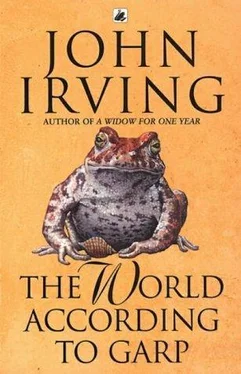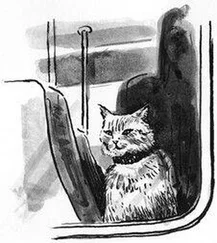Truth moved in and out of the open windows on this spring day of Garp's senior year. Garp was known for his humorless honesty, his wrestling, his English composition. His other grades were indifferent to poor. From an early age, Garp later claimed, he sought perfection and did not spread himself thin. His test scores, for general aptitude, showed that he wasn't very apt at anything; he was no natural. This came as no surprise to Garp, who shared with his mother a belief that nothing came naturally. But when a reviewer, after Garp's second novel, called Garp “a born writer,” Garp had a fit of mischief. He sent a copy of the review to the testing people in Princeton, New Jersey, with a note suggesting that they double-check their previous ratings. Then he sent a copy of his test scores to the reviewer, with a note that said: “Thank you very much, but I wasn't “born” anything.” In Garp's opinion, he was no more a “born” writer than he was a born nurse or a born ball turret gunner.
"G-G-Garp?” stuttered Mr. Tinch, bending close to the boy—who smelled the terrible truth in Senior Honors English Composition. Garp knew he would win the annual creative writing prize. The sole judge was always Tinch. And if he could just pass third-year math, which he was taking for the second time, he would respectably graduate and make his mother very happy. “Do I have b-b-bad breath, Garp?” Tinch asked.
“"Good” and “bad” are matters of opinion, sir,” Garp said.
“In your opinion, G-G-Garp?” Tinch said.
“In my opinion,” Garp said, without batting an eye, “you've got the best breath of any teacher at this school.” And he looked hard across the classroom at Benny Potter from New York—a born wise-ass, even Garp would agree—and he stared Benny's grin off Benny's face because Garp's eyes said to Benny that Garp would break Benny's neck if he made a peep.
And Tinch said, “Thank you, Garp,” who won the writing prize, despite the note submitted with his last paper.
Mr. Tinch: I lied in class because I didn't want those other assholes to laugh at you. You should know, however, that your breath is really pretty bad. Sorry.
T. S. Garp
“You know w-w-what?” Tinch asked Garp when they were alone together, talking about Garp's last story.
“What?” Garp said.
“There's nothing I can d-d-do about my breath,” Tinch said. “I think it's because I'm d-d-dying,” he said, with a twinkle. “I'm r-r-rotting from the inside out!” But Garp was not amused and he watched for news of Tinch for years after his graduation, relieved that the old gentleman did not appear to have anything terminal.
Tinch would die in the Steering quadrangle one winter night of causes wholly unrelated to his bad breath. He was coming home from a faculty party, where it was admitted that he'd possibly had too much to drink, and he slipped on the ice and knocked himself unconscious on the frozen footpath. The night watchman did not find the body until almost dawn, by which time Tinch had frozen to death.
It is unfortunate that wise-ass Benny Potter was the first to tell Garp the news. Garp ran into Potter in New York, where Potter worked for a magazine. Garp's low opinion of Potter was enhanced by Garp's low opinion of magazines, and by Garp's belief that Potter always envied Garp for Garp's more significant output as a writer. “Potter is one of those wretches who has a dozen novels hidden in his drawers,” Garp wrote, “but he wouldn't dare show them to anybody.”
In Garp's Steering years, however, Garp was also not outgoing at showing his work around. Only Jenny and Tinch got to see his progress—and there was the one story he gave Helen Holm. Garp decided he wouldn't give Helen another story until he wrote one that was so good she wouldn't be able to say anything bad about it.
“Did you hear?” Benny Potter asked Garp in New York. “What?” Garp said.
“Old Stench kicked off,” Benny said. “He f-f-froze to death.”
“What did you say?” Garp said.
“Old Stench,” Potter said. Garp had never liked that nickname. “He got drunk and went wobbling home through the quad—fell down and cracked his noggin, and never woke up in the morning.”
“You asshole,” Garp said.
“It's the truth, Garp,” Benny said. “It was fucking fifteen-below. Although,” he added, dangerously, “I'd have thought that old furnace of a mouth of his would have kept him w-w-warm.”
They were in the bar of a nice hotel, somewhere in the Fifties, somewhere between Park Avenue and Third; Garp never knew where he was when he was in New York. He was meeting someone else for lunch and had run into Potter, who had brought him here. Garp picked Potter up by his armpits and sat him on the bar.
“You little gnat, Potter,” Garp said.
“You never liked me,” Benny said.
Garp tipped Benny Potter backward on the bar so that the pockets of Potter's open suit jacket were dipped into the bar sink. “Leave me alone!” Benny said. “You were always old Stench's favorite ass-wipe!”
Garp shoved Benny so that Benny's rump slouched into the bar sink; the sink was full of soaking glasses, and the water sloshed up on the bar.
“Please don't sit on the bar, sir,” the bartender said to Benny. “Jesus Christ, I'm being assaulted, you moron!” Benny said. Garp was already leaving and the bartender had to pull Benny Potter out of the sink and set him down, off the bar. “That son of a bitch, my ass is all wet!” Benny cried.
“Would you please watch your language here, sir?” the bartender said. “My fucking wallet is soaked!” Benny said, wringing out the seat of his pants and holding up his sodden wallet to the bartender. “Garp!” Benny hollered, but Garp was gone. “You always had a lousy sense of humor, Garp!”
It is fair to say, especially in Garp's Steering days, that he was at least rather humorless about his wrestling and his writing—his favorite pastime and his would-be career.
“How do you know you're going to be a writer,” Cushie Percy asked him once.
It was Garp's senior year and they were walking out of town along the Steering River to a place Cushie said she knew. She was home for the weekend from Dibbs. The Dibbs School was the fifth prep school for girls that Cushie Percy had attended; she'd started out at Talbot, in Helen's class, but Cushie had disciplinary problems and she'd been asked to leave. The disciplinary problems had repeated themselves at three other schools. Among the boys at Steering, the Dibbs School was famous—and popular—for its girls with disciplinary problems.
It was high tide on the Steering River and Garp watched an eight-oared shell glide out on the water; a sea gull followed it. Cushie Percy took Garp's hand. Cushie had many complicated ways of testing a boy's affection for her. Many of the Steering boys were willing to handle Cushie when they were alone with her, but most of them did not like to be seen demonstrating any affection for her. Garp, Cushie noticed, didn't care. He held her hand firmly; of course, they had grown up together, but she did not think they were very good or close friends. At least, Cushie thought, if Garp wanted what the others wanted, he was not embarrassed to be seen pursuing it. Cushie liked him for this.
“I thought you were going to be a wrestler,” Cushie said to Garp.
“I am a wrestler,” Garp said. “I'm going to be a writer.”
“And you're going to marry Helen Holm,” Cushie teased him.
“Maybe,” Garp said; his hand went a little limp in hers. Cushie knew this was another humorless topic with him—Helen Holm—and she should be careful.
A group of Steering boys came up the river path toward them; they passed, and one of them called back, “What are you getting into, Garp?”
Читать дальше












